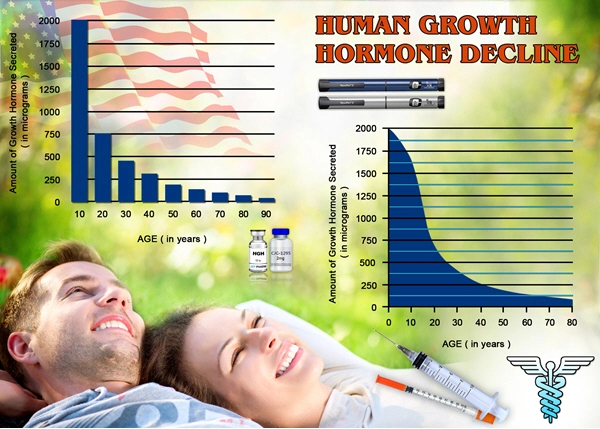Introduction
Endocrinology, the study of hormones and their actions, plays a pivotal role in men's health. Hormonal imbalances can lead to a variety of conditions, including diabetes, thyroid disorders, and testosterone deficiency, all of which can significantly impact quality of life. To enhance the standard of care for male endocrine health, it is crucial to develop and implement quality indicators specifically tailored to the needs of American men.
The Importance of Quality Indicators in Endocrinology
Quality indicators serve as benchmarks for healthcare providers to assess the effectiveness of their services and the outcomes of their treatments. In the context of male endocrinology, these indicators can help in monitoring the management of conditions such as hypogonadism, metabolic syndrome, and type 2 diabetes. By establishing clear metrics, healthcare professionals can ensure that they are providing the highest level of care and continuously improving their practices.
Development of Quality Indicators
The development of quality indicators for male endocrine care involves a multi-step process. Initially, a comprehensive review of existing literature and clinical guidelines is conducted to identify key areas of concern in men's endocrine health. This is followed by consultations with endocrinologists, urologists, and other relevant specialists to gather expert insights on the most critical aspects of care.
Once the key areas are identified, specific indicators are formulated. For example, indicators might include the percentage of men with hypogonadism who receive testosterone replacement therapy, the rate of HbA1c control in diabetic men, or the frequency of screening for thyroid disorders in at-risk populations. These indicators must be measurable, achievable, and relevant to the outcomes that matter most to patients.
Implementation Strategies
Implementing quality indicators requires a structured approach. Healthcare facilities should integrate these indicators into their electronic health record systems to facilitate data collection and analysis. Regular audits should be conducted to monitor adherence to these indicators and identify areas for improvement.
Education and training are also essential components of successful implementation. Healthcare providers need to be well-versed in the new indicators and understand how to apply them in clinical practice. Workshops, seminars, and online resources can be utilized to disseminate this information effectively.
Challenges and Solutions
One of the main challenges in implementing quality indicators is the variability in patient populations and healthcare settings. What works well in one clinic may not be as effective in another. To address this, it is important to tailor the indicators to the specific needs and resources of each facility.
Another challenge is ensuring patient engagement. Men must be informed about the importance of endocrine health and encouraged to participate in their care. This can be achieved through patient education programs and the use of patient-reported outcome measures to capture their experiences and satisfaction with the care they receive.
Impact on Men's Health
The successful implementation of quality indicators in male endocrine care can lead to significant improvements in health outcomes. By ensuring that men receive timely and effective treatment for hormonal imbalances, the risk of complications such as cardiovascular disease, osteoporosis, and infertility can be reduced. Moreover, the use of quality indicators can help in identifying disparities in care and addressing them proactively.
Conclusion
The development and implementation of quality indicators for male endocrine care represent a critical step towards enhancing the health and well-being of American men. By setting clear standards and continuously monitoring performance, healthcare providers can deliver more effective and personalized care. As the field of endocrinology continues to evolve, it is essential to remain committed to improving the quality of care through evidence-based practices and patient-centered approaches.

- Unveiling the Efficacy of Clomiphene Citrate in Treating Secondary Hypogonadism in American Men [Last Updated On: February 17th, 2025] [Originally Added On: February 17th, 2025]
- Exploring the Efficacy of hCG Monotherapy Compared to Exogenous Testosterone in Young Men with Hypogonadotropic Hypogonadism: A Focus on Testicular Function [Last Updated On: March 3rd, 2025] [Originally Added On: March 3rd, 2025]
- Impact of Insulin Resistance on Male Hormonal Health: Strategies for Optimal Testosterone Levels [Last Updated On: March 7th, 2025] [Originally Added On: March 7th, 2025]
- Optimizing Vitamin D for Androgen Balance in Hormone Replacement Therapy: Clinical Considerations [Last Updated On: March 8th, 2025] [Originally Added On: March 8th, 2025]
- Optimizing Men's Health: Understanding Allostatic Load and Hormonal Balance for Personalized Therapies [Last Updated On: March 9th, 2025] [Originally Added On: March 9th, 2025]
- Multimodal Endocrine Evaluation for Fatigue in American Men: Beyond Testosterone [Last Updated On: March 11th, 2025] [Originally Added On: March 11th, 2025]
- Exploring Neurosteroid Modulation: A Breakthrough in Managing Stress-Related Endocrine Dysfunction in American Men [Last Updated On: March 12th, 2025] [Originally Added On: March 12th, 2025]
- Exploring the Therapeutic Potential of Selective Androgen Receptor Modulators in Male Endocrine Health [Last Updated On: March 13th, 2025] [Originally Added On: March 13th, 2025]
- Exploring the Role of Oxytocin in Male Endocrinology: From Physiology to Therapeutic Potential [Last Updated On: March 15th, 2025] [Originally Added On: March 15th, 2025]
- Precision Medicine in HRT: Genomic and Metabolomic Advances for American Men's Health [Last Updated On: March 16th, 2025] [Originally Added On: March 16th, 2025]
- Gut Microbiome's Role in Men's Steroid Hormone Metabolism: Emerging Insights and Challenges [Last Updated On: March 17th, 2025] [Originally Added On: March 17th, 2025]
- Thyroid-Testicular Axis: Impact on Male Health and Fertility [Last Updated On: March 18th, 2025] [Originally Added On: March 18th, 2025]
- EDCs' Impact on Male Health: Hormone Therapy and Detoxification Strategies [Last Updated On: March 18th, 2025] [Originally Added On: March 18th, 2025]
- Adipokines: Key Regulators of Male Endocrine, Metabolic, and Cardiovascular Health [Last Updated On: March 18th, 2025] [Originally Added On: March 18th, 2025]
- Ghrelin System Modulation: A New Frontier in Weight Management for Hypogonadal Men on TRT [Last Updated On: March 18th, 2025] [Originally Added On: March 18th, 2025]
- Somatostatin Analogues: Expanding Roles in Male Endocrinology and Health Management [Last Updated On: March 18th, 2025] [Originally Added On: March 18th, 2025]
- Chronobiology's Role in Optimizing Male Hormone Testing and Therapy Timing [Last Updated On: March 18th, 2025] [Originally Added On: March 18th, 2025]
- Mitochondrial Function and Male Hormonal Health: Age-Related Decline and Therapeutic Strategies [Last Updated On: March 19th, 2025] [Originally Added On: March 19th, 2025]
- Inflammaging and Endocrine Senescence: Optimizing Hormonal Health in American Males [Last Updated On: March 21st, 2025] [Originally Added On: March 21st, 2025]
- Trace Elements' Role in Hormone Metabolism for American Men's Health [Last Updated On: March 21st, 2025] [Originally Added On: March 21st, 2025]
- Metabolomics Revolutionizes Male Endocrine Diagnostics in American Males [Last Updated On: March 21st, 2025] [Originally Added On: March 21st, 2025]
- Pharmacogenomics Revolutionizes Hormone Replacement Therapy for Men: Tailoring Treatment to Genetic Profiles [Last Updated On: March 22nd, 2025] [Originally Added On: March 22nd, 2025]
- Exercise and Hormonal Dynamics in Men: Implications for Hormone Replacement Therapy [Last Updated On: March 22nd, 2025] [Originally Added On: March 22nd, 2025]
- Managing Male Climacteric Syndrome: Symptoms, Diagnosis, and Personalized Treatment Approaches [Last Updated On: March 22nd, 2025] [Originally Added On: March 22nd, 2025]
- Neuroendocrine Integration of Energy Balance and Reproduction in American Men: Clinical Insights [Last Updated On: March 23rd, 2025] [Originally Added On: March 23rd, 2025]
- Multimarker Cardiometabolic Risk Assessment for American Males on Hormone Replacement Therapy [Last Updated On: March 23rd, 2025] [Originally Added On: March 23rd, 2025]
- Free and Bioavailable Hormones: Key to Male Endocrinology for American Men [Last Updated On: March 24th, 2025] [Originally Added On: March 24th, 2025]
- Managing Prostate Health Safely During Testosterone Replacement Therapy: A Guide for American Men [Last Updated On: March 24th, 2025] [Originally Added On: March 24th, 2025]
- Pituitary Incidentalomas in Men: Evaluation, Management, and Long-Term Monitoring [Last Updated On: March 24th, 2025] [Originally Added On: March 24th, 2025]
- HRT and Telomere Length: Impacts on Aging and Longevity in American Males [Last Updated On: March 24th, 2025] [Originally Added On: March 24th, 2025]
- Subclinical Endocrinopathies in Men: Diagnosis, Treatment, and Health Impacts [Last Updated On: March 24th, 2025] [Originally Added On: March 24th, 2025]
- Male Biological Clock: Endocrine Impacts on Fertility and Offspring Health in Aging American Men [Last Updated On: March 24th, 2025] [Originally Added On: March 24th, 2025]
- Endocrine Frailty in Aging American Men: Understanding and Multimodal Intervention Strategies [Last Updated On: March 25th, 2025] [Originally Added On: March 25th, 2025]
- NAFLD and Male Endocrine Health: A Bidirectional Impact and Management Strategies [Last Updated On: March 25th, 2025] [Originally Added On: March 25th, 2025]
- Opioid-Induced Endocrinopathy in American Men: Mechanisms, Symptoms, and Management [Last Updated On: March 25th, 2025] [Originally Added On: March 25th, 2025]
- Diurnal Hormone Variations: Impact on Men's Endocrinology and Therapy Optimization [Last Updated On: March 25th, 2025] [Originally Added On: March 25th, 2025]
- Endocrine Reserve Testing in Men: Applications, Limitations, and Future Directions [Last Updated On: March 25th, 2025] [Originally Added On: March 25th, 2025]
- BMD Monitoring Protocols for Men on Hormone Replacement Therapy: Endocrinological Insights [Last Updated On: March 25th, 2025] [Originally Added On: March 25th, 2025]
- OSA's Endocrine Effects in Men: Beyond Testosterone to HPA, Thyroid, GH, RAAS [Last Updated On: March 25th, 2025] [Originally Added On: March 25th, 2025]
- Hormone Optimization: Preventing Sarcopenia in Aging American Males [Last Updated On: March 25th, 2025] [Originally Added On: March 25th, 2025]
- Longitudinal Epigenetic Changes from HRT in American Men: Endocrinological Insights [Last Updated On: March 26th, 2025] [Originally Added On: March 26th, 2025]
- SHBG: Beyond Transport - Its Role in Male Hormonal and Metabolic Health [Last Updated On: March 26th, 2025] [Originally Added On: March 26th, 2025]
- Managing Polycythemia in Men on Testosterone Therapy: Evidence-Based Strategies [Last Updated On: March 26th, 2025] [Originally Added On: March 26th, 2025]
- Biomarkers in Male Endocrinology: Growth Factors and Cytokines in Diagnosis and Treatment [Last Updated On: March 26th, 2025] [Originally Added On: March 26th, 2025]
- Testosterone's Immunomodulatory Effects on Autoimmune Diseases in American Men [Last Updated On: March 26th, 2025] [Originally Added On: March 26th, 2025]
- HPT Axis Recovery After Exogenous Testosterone: A Comprehensive Guide for American Men [Last Updated On: March 27th, 2025] [Originally Added On: March 27th, 2025]
- Neuropeptide Y: Key Regulator in Male Endocrine and Metabolic Health [Last Updated On: March 27th, 2025] [Originally Added On: March 27th, 2025]
- Hormone Replacement Therapy Enhances Cognitive Function in Aging Men: A Comprehensive Review [Last Updated On: March 27th, 2025] [Originally Added On: March 27th, 2025]
- Genetic Insights and Personalized Treatments for Male Hypogonadism [Last Updated On: March 27th, 2025] [Originally Added On: March 27th, 2025]
- Luteinizing Hormone: Key Roles in Men's Health and Endocrinology [Last Updated On: March 27th, 2025] [Originally Added On: March 27th, 2025]
- Leptin Resistance in American Men: Endocrine Impacts and Targeted Interventions [Last Updated On: March 27th, 2025] [Originally Added On: March 27th, 2025]
- ECS Influence on Male Reproductive Health: Insights for American Males [Last Updated On: March 27th, 2025] [Originally Added On: March 27th, 2025]
- Innovative Androgen Receptor Techniques Revolutionize Men's Hormone Therapy in the US [Last Updated On: March 27th, 2025] [Originally Added On: March 27th, 2025]
- INSL3: A Stable Biomarker for Assessing Leydig Cell Function in Men [Last Updated On: March 27th, 2025] [Originally Added On: March 27th, 2025]
- Post-Traumatic Hypopituitarism in American Men: Diagnosis, Treatment, and Support [Last Updated On: March 28th, 2025] [Originally Added On: March 28th, 2025]
- Vasopressin's Role in Male Endocrinology: Therapeutic Potential and Clinical Applications [Last Updated On: March 28th, 2025] [Originally Added On: March 28th, 2025]
- AMH's Expanding Role in Adult Male Endocrinology: From Fertility to Cardiovascular Health [Last Updated On: March 29th, 2025] [Originally Added On: March 29th, 2025]
- Inhibin B: Key Biomarker for Male Fertility and Testicular Health Assessment [Last Updated On: March 30th, 2025] [Originally Added On: March 30th, 2025]
- Long-term Endocrine Effects of Traumatic Brain Injury in Men: Management and Follow-up [Last Updated On: March 30th, 2025] [Originally Added On: March 30th, 2025]
- Chemotherapy-Induced Endocrine Disruption in Men: Monitoring and Intervention Strategies [Last Updated On: March 30th, 2025] [Originally Added On: March 30th, 2025]
- Hyperparathyroidism's Impact on Male Reproductive Health: Diagnosis and Management Strategies [Last Updated On: April 1st, 2025] [Originally Added On: April 1st, 2025]
- Radiation-Induced Hypopituitarism in Men: Hormonal Deficiencies and Replacement Therapies [Last Updated On: April 1st, 2025] [Originally Added On: April 1st, 2025]
- Chronic Kidney Disease: Impacts and Management of Male Endocrine Function [Last Updated On: April 3rd, 2025] [Originally Added On: April 3rd, 2025]
- Hemochromatosis in Men: Endocrine Effects, Screening, and Management Strategies [Last Updated On: April 5th, 2025] [Originally Added On: April 5th, 2025]
- Cushing's Syndrome in Men: Clinical Features, Diagnosis, and Hormone Therapy Management [Last Updated On: April 5th, 2025] [Originally Added On: April 5th, 2025]
- Endocrine Insights into Male Sexual Desire Disorders: Diagnosis and Treatment Options [Last Updated On: April 6th, 2025] [Originally Added On: April 6th, 2025]
- Adrenal Incidentalomas in Men: Endocrine Evaluation and Management Algorithm [Last Updated On: April 6th, 2025] [Originally Added On: April 6th, 2025]
- Hormonal Factors and Treatment Strategies for Male Stress Urinary Incontinence [Last Updated On: April 7th, 2025] [Originally Added On: April 7th, 2025]
- Optimizing GH and IGF-1 in Male Athletes: Performance, Health, and Ethics [Last Updated On: April 8th, 2025] [Originally Added On: April 8th, 2025]
- Osteoporosis in Men: Diagnosis, Endocrine Evaluation, and Multifaceted Management Strategies [Last Updated On: April 9th, 2025] [Originally Added On: April 9th, 2025]
- Enhancing Endocrine Resilience in American Men: Biological Mediators and Lifestyle Strategies [Last Updated On: April 10th, 2025] [Originally Added On: April 10th, 2025]
- Endocrine Management of Hormone Therapy in Transgender Men: Protocols and Health Outcomes [Last Updated On: April 10th, 2025] [Originally Added On: April 10th, 2025]
- Male Hormonal Contraception: Endocrine Mechanisms and Clinical Progress in American Males [Last Updated On: April 11th, 2025] [Originally Added On: April 11th, 2025]
- HRT in Male Fertility: Current Practices and Future Innovations for American Men [Last Updated On: April 12th, 2025] [Originally Added On: April 12th, 2025]
- AI Revolutionizes Precision Endocrinology for Personalized Men's Hormone Therapy [Last Updated On: April 12th, 2025] [Originally Added On: April 12th, 2025]
- Androgen Action: Molecular Biology and Targeted Endocrine Therapies in Men [Last Updated On: April 14th, 2025] [Originally Added On: April 14th, 2025]
- Validating and Implementing PROMs in Male Endocrinology for American Men [Last Updated On: April 15th, 2025] [Originally Added On: April 15th, 2025]
- CGM's Role in Managing Endocrine Disorders in American Men: Beyond Diabetes [Last Updated On: April 16th, 2025] [Originally Added On: April 16th, 2025]
- Integrative Endocrinology: Holistic Hormone Management for Men's Health [Last Updated On: April 17th, 2025] [Originally Added On: April 17th, 2025]
- Wearable Tech Revolutionizes Hormone Monitoring for Men's Health [Last Updated On: April 17th, 2025] [Originally Added On: April 17th, 2025]



List of USA state clinics - click a flag below for blood testing clinics.
Word Count: 586



















































